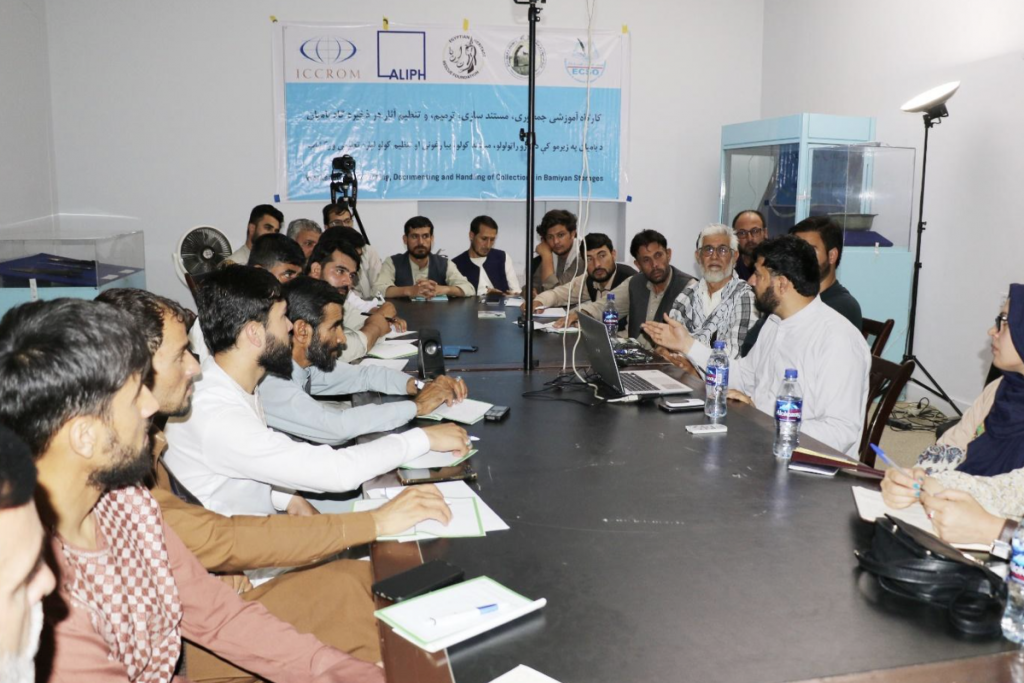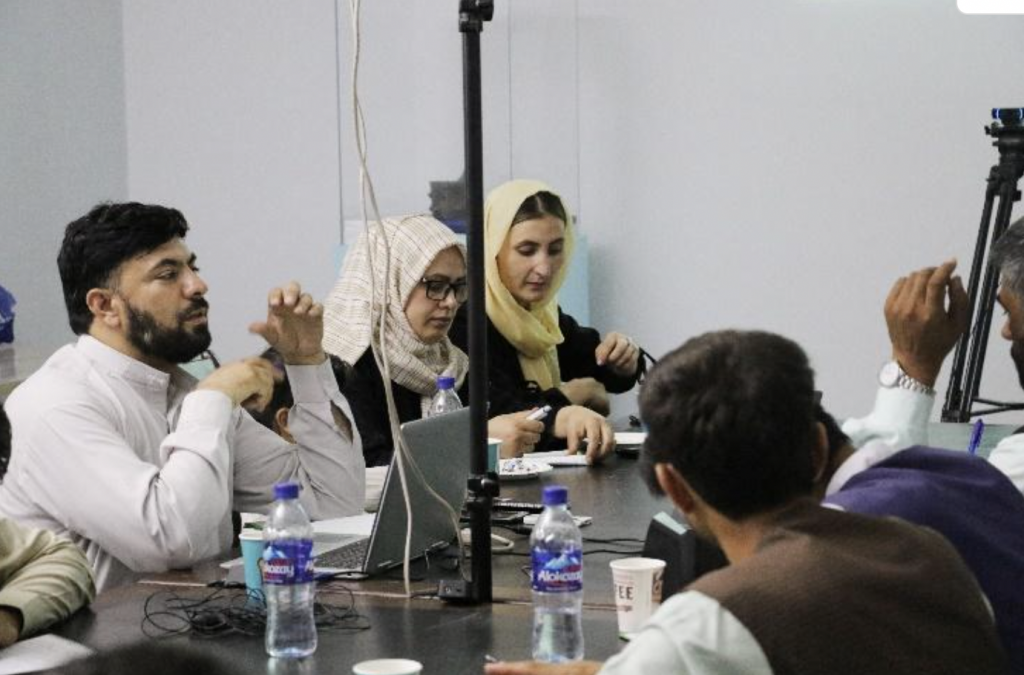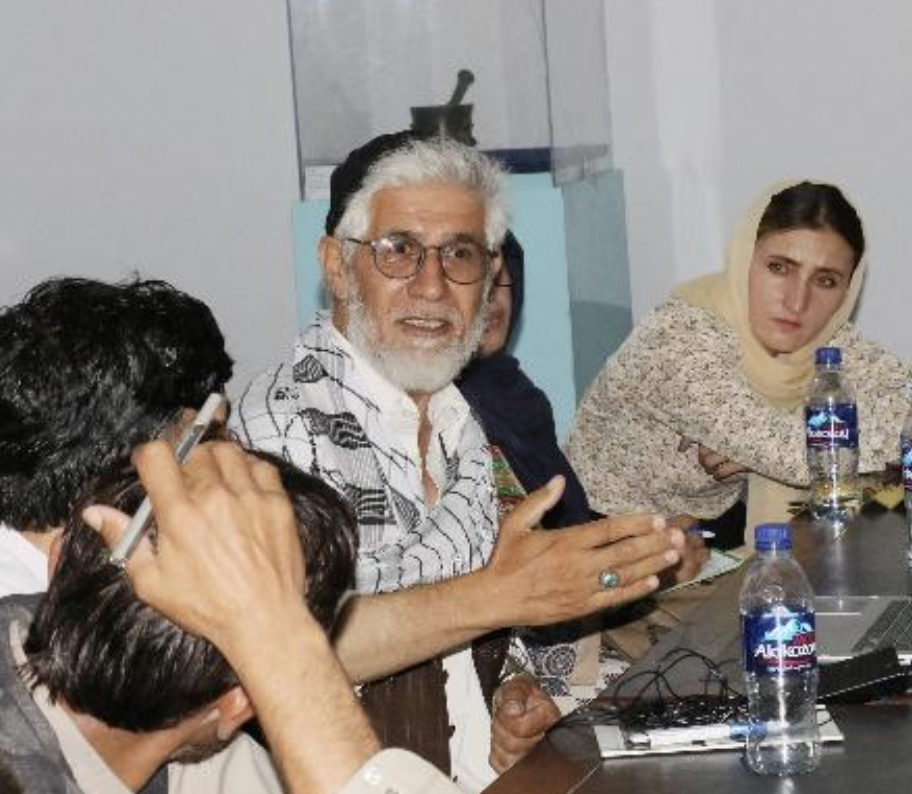ICCROM’s FAR programme is pleased to announce the successful completion of a three-day workshop on safeguarding heritage collections in the World Heritage site Bamiyan Valley in Afghanistan. The training aimed to empower Afghan heritage professionals to protect their heritage in challenging times. Through interactive discussions and online exercises, participants learned how to manage heritage items in a crisis scenario and how to stabilize, document and relocate the collections to safety.
 With intensifying geopolitical tensions, heritage becomes a target, leading to conflict. Hence, ICCROM is taking proactive action by providing training to develop peacebuilding tools and secure at-risk heritage sites that have been destroyed through acts of violence in the past and could be targeted again.
With intensifying geopolitical tensions, heritage becomes a target, leading to conflict. Hence, ICCROM is taking proactive action by providing training to develop peacebuilding tools and secure at-risk heritage sites that have been destroyed through acts of violence in the past and could be targeted again.
The workshop was part of the Alliance for Cultural First Aid, Peace and Resilience capacity development project, spearheaded by ICCROM in collaboration with the ALIPH Foundation and the Egyptian Heritage Rescue Foundation (EHRF). The project aims to strengthen capacities for risk reduction, preparedness, response and recovery among communities adversely affected by armed conflicts, extreme hazard events and epidemics. The project focuses on parts of the Middle East, North Africa, Afghanistan and Pakistan (MENAP) region affected by intersecting conflicts, which have led to extreme vulnerabilities to hazard events and health crises.
We conducted this workshop in close collaboration with one of our project mentors, Mohammad Fahim Rahimi, the director of the National Museum of Afghanistan.
The workshop comprised 22 participants from a range of professional backgrounds – including archaeologists, curators, conservators, heritage professionals and disaster risk management specialists – and institutions, including the National Museum of Afghanistan, Education & Culture Social Organization (ECSO) and the Ethnography Museum.
 On the first day of the workshop, Mohammad Fahim Rahimi introduced the participants to the historical and cultural context of the existing Tarzi storage, giving them an overview of the storage’s deteriorating conditions. The participants got acquainted with the type and number of the collections and their significance and value. Following that, Habibullah Habib, a disaster risk management specialist from ECSO, presented Afghanistan’s risk and hazard profile, zooming in on the Bamiyan region in particular. His presentation focused on the adverse effects of natural hazards on heritage and communities.
On the first day of the workshop, Mohammad Fahim Rahimi introduced the participants to the historical and cultural context of the existing Tarzi storage, giving them an overview of the storage’s deteriorating conditions. The participants got acquainted with the type and number of the collections and their significance and value. Following that, Habibullah Habib, a disaster risk management specialist from ECSO, presented Afghanistan’s risk and hazard profile, zooming in on the Bamiyan region in particular. His presentation focused on the adverse effects of natural hazards on heritage and communities.
On the second day of the workshop, two experts from the EHRF, Chairman Abdelhamid Sayed and Executive Director Amira ElSayed shared their valuable knowledge and experience in the field. EHRF has partnered with us to organize our two-year capacity development project.
On the third day of the workshop, Hebatallah Abdelhamid from EHRF gave an insightful presentation on organizing safe storage following international norms and guidelines. The presentation was followed by an exercise to test and amplify the participants’ knowledge and prepare them for future activities in the field.

After the workshop concluded, the team went on a field trip into the Bamiyan Valley to test their new knowledge and apply first aid measures to damaged collections. After carefully handling the existing collections, participants will take part in relocating the collections to safer storage in the Bamiyan Cultural Center.
The project to reorganize the archaeological storage in the Bamiyan Valley is part of the Alliance for Cultural First Aid, Peace and Resilience project, spearheaded by the FAR Programme, ICCROM, in collaboration with the ALIPH Foundation and the Egyptian Heritage Rescue Foundation.
Photo credits: Mohammed Fahim Rahimi
